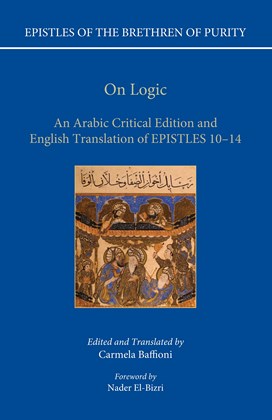On Logic An Arabic critical edition and English translation of Epistles 10–14
Oxford University Press in association with the Institute of Ismaili Studies
The Ikhwān al-Ṣafāʾ (Brethren of Purity), the anonymous adepts of a tenth-century esoteric fraternity based in Basra and Baghdad, hold an eminent position in the history of science and philosophy in Islam due to the wide reception and assimilation of their monumental encyclopaedia, the Rasāʾil Ikhwān al-Ṣafāʾ (Epistles of the Brethren of Purity). This compendium contains fifty-two epistles offering synoptic accounts of the classical sciences and philosophies of the age; divided into four classificatory parts, it treats themes in mathematics, logic, natural philosophy, psychology, metaphysics, and theology, in addition to didactic fables.
The present volume is the second of this definitive series, consisting of the very first critical edition of the Rasāʾil in its original Arabic, complete with a fully annotated English translation. Prepared by Professor Carmela Baffioni, Epistles 10–14 detail the foundations of Aristotelian logic, including the ten categories of existents, the five predicables, and his formative method of syllogistic inference. With the claim that logic is the noblest of man’s arts, and man the noblest of creatures, the Ikhwān cast the topic in an innovatively spiritual light.
Acknowledgements
Foreword
Introduction
Technical Introduction
Epistle 10: On the Meaning of the Isagoge
Epistle 11: On the Meaning of the Categories
Epistle 12: On the Meaning of the On Interpretation
Epistle 13: On the Meaning of the Prior Analytics
Epistle 14: On the Meaning of the Posterior Analytics
Appendix A: Additions to Epistle 10 from the Atif Manuscript
Appendix B: Epistle 10 in the Bodleian Manuscripts
Appendix C: Addition to Epistle 12 from the Esad Effendi 3638 Manuscript
Bibliography
Subject Index
Index Locorum
Rasāʾil 10–14 (Arabic Text and Variants)
Arabic Index
‘The publications that are planned within this project will no doubt rekindle the interest of scholars and students of Islam in Islam's rich cultural, educational and historical legacy . . . The work of the Ikhwan al-Safa, like many other works that make up the classical Muslim educational thought, need to be seriously studied and reflected upon. This new publication project contributes immensely towards realizing this educational aim.’
– Abdullah Sahin, Muslim World Book Review, about Epistles of the Brethren of Purity series
‘this volume is a fine achievement in its own right, and a promising start to a series which is likely to revolutionize our understanding of the Brethren.’
– Peter Adamson,Journal of Islamic Studies
Carmela Baffioni is Full Professor of History of Muslim Philosophy at the Universita degli Studi di Napoli ‘L’Orientale’. In addition, she is a member of the Academia Europaea in the Section ‘Classical and Oriental Studies’ and a founder member of the Section of Studies on the Near East Arabic Session of the Accademia Ambrosiana.
Besides those on the Ikhwān al-Ṣafāʾ, her articles focus on al-Kindī, al-Fārābī, Yaḥyā ibn ʿAdī, Avicenna, Averroes, and some Latin elaborations of Arabic heritage. Her numerous publications include studies on the fourth book of Aristotle’s Meteorologica and its Arabic tradition; Italian translations with commentaries of Epistles 42 and 40 of the Ikhwān al-Ṣafāʾ; and the catalogue (in Arabic and French) of the manuscripts of the Ahel Habott Foundation, Cinguetti. She has also written some general works on the history of Muslim philosophy, as well as having translated books from German and Russian and having edited six collective works.

